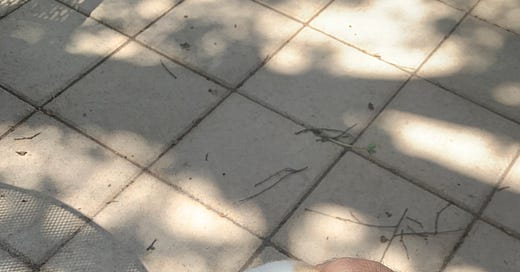The last two pieces I’ve written here have had, unwittingly, the same theme: limits. It feels a little self-evident to say that nothing can do everything, but there are plenty of Substacks that try to make everything a hammer that fits their nail, trading on abundance and endless breadth. So, maybe it’s worth repeating:
The Limits of Christian Advocacy in Post-Christian America
American Christian advocacy in public needs some new exemplars. But there’s one that’s always been around.
The Limits of Testimony and Local Thinking: On Alex Garland's WARFARE
Reminder: May 12th is our first session of Amusing Ourselves to Death. Become a supporting subscriber to join in!
In these two pieces, I’ve put together fragments of my frustration to an assumption that is seemingly everywhere: universal promises of a solution without limit.
Universal causes or universal remedies that work like a Leatherman tool in every and all moral situations: testimony is the trump card to understanding another person; public proclamation is the key to opposing abusive public situations. A thousand Substacks are launched every year on similar premises, that it’s possible to whack all the moles with the same hammer of aesthetics, or “mystery” or your favored identity marker, and I wish them well1.
But that sounds exhausting, and also untrue. For every tool—even moral reason— has its limits, a way in which it could be concievably applied more broadly, but deforms as it goes2. As I indicated in these pieces, what utility there might be with testimony or public speech also comes with the possibility of counter-testimony, or of institutions capable of sustaining that speech. All of these render the singular use of testimony or statements limited, even if we include other testimonies or institutions: good life requires more than discourse or institutions. This is because, I think, creation goes hand in hand with limits to what anything in creation can do, or more broadly, how any creature can live well. How could the repair of creation, thus, work in any other way than that of particularity, and with that, limit to what a particular creature, idea, or good is for?
Part of my preoccupation with this notion of limits is, I’m sure, is a function of getting older. For limits are, in one sense, what it takes to be good at one thing. To be good at one thing, you have to be really mediocre at many other things. My oldest has begun, at 11, to humble me at foosball and Minecraft. It is the first of many modest humiliations to come, as he will grow taller than me by high school, more proficient musically than me now. But I, for the moment, remain wiser than him, more versed in Christian moral reasoning, and having spent more hours on this one thing than he can imagine playing Minecraft. And that has come with its own set of costs, forgoing some goodnesses for the sake of this one skill.
This one thing that I think I’m getting better at with age cannot do everything. It cannot navigate public policy or make you laugh. But it can point us toward goodness, and that, I think, is a goal worth pursuing. But it can’t say all there is.
But limits haunt me in a more mundane sense. My weekly exercise routine is a persistent shoulder tap that I am, against all odds, not as young as I was once was. Stanford researchers give me hope that this is not just my imagination, but that there are little collapses that happen in our biology, and that if I should find myself in a metaphorical dark woods in my late 40s, it’s not my imagination. I could take this as occasion for lament, but why? Time is on my side, but only because there is time at all: it’s part of creation, even if time is not given infinitely.
Bonhoeffer and the Limits of Creation
This notion of limits as good is one that I’ve been playing with for a while, mostly under the influence of Dietrich Bonhoeffer, who returns to this notion quite frequently. For rather than constantly emphasize universal responsibility, Bonhoeffer frequently trades on the limits of responsibility that come with being a creature of time. This, he writes, is first the condition of the creature who lives in a world under sin:
"Humankind no longer lives in the beginning; instead it has lost the beginning. Now it finds itself in the middle, knowing neither the end nor the beginning, and yet knowing that it is in the middle. It knows therefore that it comes from the beginning and must move on toward the end.3”
Here, in Creation and Fall, Bonhoeffer acknowledges that the world in which we live is one in which finitude shakes hands with a loss of orientation: we are running out of time, and not sure where exactly we are supposed to run to.
The opposite to this is not, however, to be unlimited. For even prior to the Fall, it appears that limits were intrinsic to our constitution. As he writes:
"Adam's knowing is embedded in Adam's freedom for God, in unbroken obedience to God; it is knowledge arising from the freedom of the creature, knowledge in life, knowledge in ignorance.4”
It was never the case that we were without limits, but that in obedience to God, our obedience and God’s endless giving of God’s self to us was known as a kind of endless freedom which was ignorant of what other kind of life there might be apart from God’s own life.
You cannot have it all, nor, theologically, is that a good idea. Why would the people of God want Baal? Or more difficultly, why would the people of God want some hypothetically good thing when God’s provision is there already?
This way of thinking about limits is moves us away from a notion of limits as restrictive and toward one of limits being, ironically, incredibly expansive. This is, of course, a Christological point: God is particularly in Jesus of Nazareth, in this place, in this form. For Bonhoeffer, the divine economy presumes that by limiting one’s self to God, all other things will come into view5. Karl Barth, in his theological approach, does something similar by directing our attention to the incarnation of Jesus: in beginning with this one thing, all else about who God is and has done comes into view. We find the narrow gate, and walk through it, finding an entire world on the other side. In the limit of Christ’s body, we gain a purchase on what creation is, what our bodies are, what time is and might be, but only by limiting ourselves, in a similar way to Bonhoeffer6.
But saying this—that in God all things are given—does not mean that all time is now available, or all opportunities are open to us, or that our energy and opportunity to shape the world is boundless. Far from it. It means, rather, that there is a reordering to how we want all other possibilities, focused through this one thing. As he sat in prison at the end of his life, he frequently engaged in lament for lost connection and unworkable futures. He would never see his fiancee again7. He would miss his nephew’s baptism. He would never be a part of Germany’s reconstruction or the church rising up from the ashes8. And in and through this, Bonhoeffer never lamented against limited creation, but against the loss of the goodness that his one particular life could give. It was always going to end; there was always going to be loss; limits were part of what steer us toward deepening and stewarding that goodness.
The question isn’t where this notion of limits affects us: where does this not affect us? In what avenue of life are we not confronted with scarcities and persuade ourselves that we’ll have enough time, competency, energy, or money to overcome the problem at hand? In what challenge are we not tempted to reach for the one thing that we know works, and to beat the world around us into submission again and again?
To live well in God’s creation—as God’s creatures—means receiving this one weird life as given with limits, and to likewise be humble enough to know that tools we have at hand are themelves limited. None of this makes them the limited beings bad: it makes them creatures fit for communion in a world in which none can have what it needs alone. It means being willing to cultivate new tools, to dig into new places and new challenges with a sense of being overwhelmed by them at first, because we have come up short9.
Limits aren’t going anywhere, insofar as to abolish them is to abolish the world. But then again, in some renderings and forms of advocacy, maybe that’s the point. As for me and my house, we will enjoy our numbered days, squeeze goodness and water from the rocks, learn the new skills that are needed, and go on anyway.
I strongly suspect that plays into why nearly 45% of Substacks are abandoned: writing on one thing as the key to everything inevitably runs dry, just like having a Substack about nothing in particular. I mean, sometimes people leave because of the need for Substack to not be a writing mechanism, but that’s not for today.
To bring this home: not every problem in church is the result of insufficient moral reason. Sometimes, there’s just misunderstanding or garden-variety difficulties. I wrote about this, and stand by it.
Of Course Church Will Hurt Us: How Could It Not?
What if harm is an enduring feature of living in the world?
Creation and Fall, 28.
Ibid., 87.
This is not only “and all of these things will be given unto you”, or that the disciples will be paid back tenfold in the life to come, but that if Christ is the one in whom all things hold together, then all things are given in and through a very particular starting point.
There are others in this era working with this notion, often with the approach that the ideal creates an impossible measure that human agency cannot achieve. I have in mind Reinhold Niebuhr’s Interpretation of Christian Ethics in particular. This fails for multiple reasons, I think, but centrally, it presumes that what is present in and through our finitude must be judged as insufficient in light of a hypothetical maximum. Why assume this? Why not assume that God has in fact given, in the conditions of creation, what is needed for us to actually know God and live well with God?
Charles Marsh’s book complicates this. I know, I know.
The degree to which the German church rose from the ashes is complicated, most evidently by the fact that only 3-4% of the population now attends with any frequency, Protestant or Catholic.
Here, I love Dustin Benac’s definition of crisis as “coming up short”: it’s not a failure, but an acknowledgment that what one has at present in insufficient. You can either moan about it, try to make the world conform to your limited tools, or get to work.






